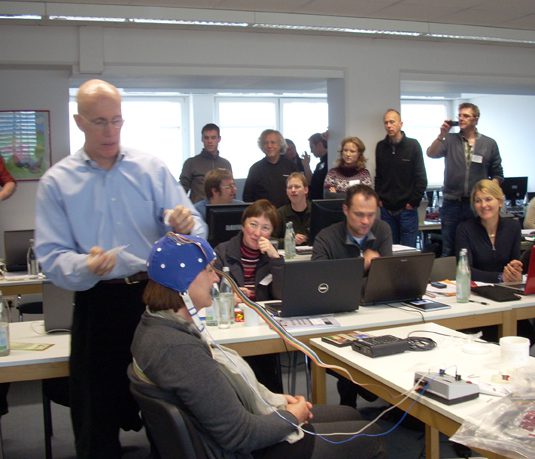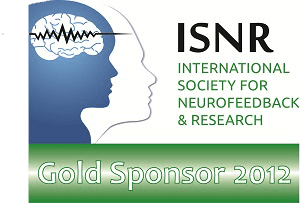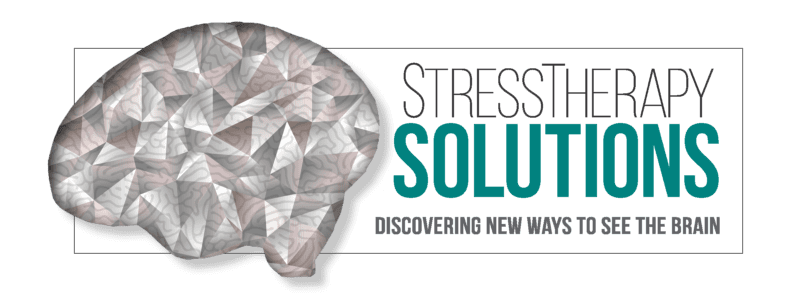bring neuroscience and scientific validation into your practice

GNI Academy
on the planet.
We’ve designed our business to grow yours, keep you ahead of the curve, and help you help your patients build a better life. Since the 2000s, we have facilitated training and education by choosing independent specialists and experts from within the Neurofeedback community to present workshops to licensed practitioners, researchers, and educators.
We specialize in these workshops and lectures:
- Biofeedback
- EEG (electroencephalograph) brainwave training
- qEEG (quantitative electroencephalograph)
- Database Guided Training
- sLORETA Training
- Clinical ethics and marketing guidance
- Personal mind fitness
- Brainwave monitored meditation
- Neurofeedback /EEG biofeedback use in the clinical setting
• Also called Neurofeedback (NFB), EEG biofeedback, brainwave training, or brain fitness.
• Involves placing small sensors (similar to tiny microphones) on the head to record brainwave activity using real-time displays of electroencephalography (EEG).
• Information gathered during the process can be used to teach the brain to operate more efficiently by providing
visual and auditory feedback, and utilizing a reward-incentive to the client’s brain as their brainwave patterns improve and self-regulation occurs.
• Can include a QEEG assessment (quantitative electroencephalography), where your client’s brain function is compared to a normative database, and converted to a brain map to be used as a tool for validation and guidance.
• Usually involves 2-3 sessions/week, fifteen to forty minutes per session. Number of sessions depend upon client goals.
How does Neurofeedback work?
• Observing brainwave activity and function, giving information related to why and how a client may struggle with certain issues.
• Creating a training and learning program to better target underlying.
• Neurophysiological factors that may exacerbate symptoms or hinder progress.
• Assisting the brain to improve or change brainwave patterns by incorporating a positive reward incentive to better improve function.
• Using visual and auditory feedback, such as music, games, imaging, and even educational or entertainment movies.
• Working with the client as functioning improves, and providing emotional support and cognitive tools that help the client complete the process of improvement.
Who is Neurofeedback for?
• NFB can be a favorable option for all ages with a wide range
of concerns. It is also oftentimes used for healthy brains looking
to reach peak performance. For many patients seeking this form
of training, their brains have become stuck in a rigid pattern of
responding. NFB training can help the brain become more
flexible and efficient.
• Improved quality of sleep.
• Uplifted mood, emotional balance.
• Reduction in overall stress.
• A change in symptoms.
• Improved peak performance (athletes, musicians, executives, students).
• Feeling empowered through being an active participant.
Why is Neurofeedback Important to Me as as Practicioner?
• In the rapidly developing field of brain health, an understanding of brain function and how it affects the mental, emotional, and physical states of individuals seeking help is becoming critical to the quality of services being provided. Neurotherapy offers evidence-based options demonstrated to be effective over the last fifty years.
• Non-toxic, non-invasive alternative to medication
• Assist in gathering information about why an individual may be having symptoms based on brainwave activity
• Target underlying dysregulation in brain activity
• Gather valuable baseline brain data
• Promote positive changes at the source of the problem
• Track changes in brain function (validation)
Why are clinicians choosing Neurofeedback for their practices?
1. The patient needs more help than medications and psychotherapy can offer.
Most experienced clinicians are well aware of the limitations of medications and psychotherapy. But what are their options?
Neurofeedback, also known as neurotherapy is not strange, and it’s not new. Few clinicians are aware of neurotherapy and how far it has advanced. Once they hear about it and start to look into it further, they will often say that it made sense to offer it to their clients. That’s true for even very conservative professionals. They just have to be willing to jump in. Most clinicians who adopt neurotherapy already have 15 to 20 years or more of experience. It’s clearly not the young clinicians who pick it up first. It seems experienced clinicians are more acutely aware of the limits of medications and psychotherapy.
2. Clients are demanding an alternative to medications.
Doctors and parents are often concerned about the side effects and long-term consequences that medications have on children. Parents and patients push for alternatives that work. When they learn about neurotherapy, they’re often more open and interested initially than many clinicians.
3. It makes sense to self-regulate the brain.
Many clinicians claim that the idea that you can train the brain and improve self-regulation through neurotherapy simply makes sense. So how does a clinician help the client change the brain? Meditation, yoga, or deep breathing sometimes help. But many of the problems patients bring need supplemental interventions. Neurotherapy helps an individual learn to regulate their brain by increasing certain activity and decreasing other activity.
4. The neurophysiology is compelling.
Some clinicians are unconvinced or very cautious as they look into neurotherapy. However, once they attend a very good course that makes the neurophysiology understandable, it can be an “a-ha” moment. (Note – this isn’t simple stuff and it takes some effort to get it). When someone changes their EEG you are by definition changing activation and timing patterns. These affect many pathways and feedback loops in the brain. When you start to understand such mechanisms, neurotherapy becomes more compelling.
5. Symptoms improve quickly.
Seeing someone experience a change rapidly that cannot be explained any other way never fails to amaze. The brain can shift states very quickly. As an example, in many training courses we’ve observed, by the end of several days of training, 80+% of attendees have noticed clear, significant changes in state. Changes influence sleep, mood, alertness, or attention. For some clients, changes – often quite unexpected changes – occur in minutes. Experienced clinicians quickly note these unexpected changes cannot be placebo, and can only be explained by the training. NOTE: Ten or more training sessions, depending on the severity of the client’s condition, are needed before any short-term transitory changes can be expected to hold.
6. The research is impressive.
Though the “lack of research” or its limitations are often cited, that’s usually from people who haven’t read much of it. When clinicians read enough of the research and look at some outcome studies, particularly with ADD, depression anxiety, and addictions, it’s very hard to dismiss. Neurofeedback is evidence-based. The size of the clinical effect is impressive, compared, for example, to the minimal effects you see in many studies on medications.
7. Other clinicians recommend neurotherapy.
Clinicians will often look into neurotherapy after hearing another clinician talk about its success and impact. Providers who are experienced in neurofeedback can offer some excellent clinical insights.
8. Family, friend, or patient who has experienced neurotherapy recommend it.
Many clinicians enter this field because someone they have personally met has experienced a success that was simply too life-changing to dismiss. It could be chronic depression that’s no longer chronic. Or perhaps a very out-of-control child who has settled down and is making great grades. But what’s especially compelling about neurotherapy successes is that the changes tend to sustain over time. How many alternative treatments see changes sustain two, four, or five years later?
Copy adapted from and used with permission of www.aboutneurofeedback.com
What about client charges and insurance?
National average:*
• Neurofeedback Training $75-$150 per session
• QEEG/Brain Mapping $450-$500 per pre/post assessment
* Insurance reimbursement for brain mapping, assessment, and biofeedback varies greatly from state to state and is dependent upon your licensure. Please check your state’s regulations for more information. Common codes are available upon request.
Certification is rapidly becoming the professional standard and lets clients know the neurotherapist has met the stringent criteria for BCIA certification. CLICK HERE for more information about certification.
Education, certification, training opportunities
• Workshops
• In-Services
• Webcasts/Video Tutorials
• Mentoring
• Comprehensive NFB Certification (BCIA, QEEG, etc.)
• Free, unlimited Tech Support for our affiliates.
Certification is rapidly becoming the professional standard and lets clients know the neurotherapist has met the stringent criteria for BCIA certification. CLICK HERE for more information about certification.
For what kinds of clinical issues/presenting problems is neurofeedback useful?
Neurofeedback is also used by some medical professionals who focus on neurological conditions such as TBI (Traumatic Brain Injury) and recovery from strokes.
Are there some kinds of issues I shouldn't use neurofeedback for?
What equipment will I need to buy to provide neurofeedback? How much does it cost?
For BrainMaster you will need three things:
- A Windows-based laptop computer with a fast processor and a good video card (click here for a complete list of necessary specifications for the laptop) LINK NEEDS to be UPDATED
- A neurofeedback amplifier system with 2, 4, or 19 channels
- Software to process the brainwave data coming from the sensors and amplifier
Many people learn more about how to use this equipment at a Neurofeedback Bootcamp for Beginners workshop. BrainMaster does not sell the laptop computer; the cost of the professional neurofeedback system and software starts at approximately $1700 [IS THIS CURRENT?]. Find out more about the BrainMaster systems by clicking on a link below.
- Atlantis I (4 channels)
- Atlantis II (2 channels)
- Discovery 24E (20 channels)
Do you want to include the Freedom?
Do I need to have a health care license to use neurofeedback in my practice? Do I need to be certified?
BCIA now offers Technician Certification for individuals with who are working for a licensed and BCIA certified professional who takes legal responsibility for their work. Currently, this certification is offered only for those who are working in the US and Canada. See the BCIA website for more information. https://www.bcia.org/i4a/pages/index.cfm?pageid=3431
BrainMaster equipment and training is only available to licensed clinical professionals and to universities for research. If you have any questions about this policy, please call us at (440) 232-6000 ext 200 or 201. [ANY CHANGES TO THIS?]
Is ongoing support or mentoring available after I take the initial neurofeedback training?
Which of your workshops would be best for me to take as a beginner wanting to add neurofeedback to my practice?
What is Neurofeedback? An Update
Compendium of Common Terms in EEG & Neurofeedback
Cheat Sheet for Neurofeedback
Is Neurofeedback reimbursable?
Bibliography of Neurofeedback
Biofeedback & Neurofeedback, 3rd Edition

Evidence-based Practice in Biofeedback & Neurofeedback 3rd Edition Spiral-bound – March 1, 2016 $75.95
If you have any questions, comments, concerns, or to register for services or workshops, please contact us!
If you prefer you may call Lisa Mrklas at
216-766-5707
Disclaimers:
StressTherapy Solutions
*The views or opinions expressed by workshop instructors or presenters, are not necessarily those of StressTherapy Solutions, Inc. StressTherapy Solutions Inc. is a marketing corporation offering educational workshops, trainings, live internet workshops, onsite workshop and webcams which are taught by independent biofeedback professionals who consult their services to StressTherapy Soutions Inc. Educational workshops are available to licensed practitioners seeking information relative to biofeedback and natural health related subjects and use. Various workshops offer "general" industry standard educational information helpful to all practitioners regardless of the equipment they choose to use. Attendees utilizing equipment from BrainMaster Technologies Inc., Thought Technologies, Nexus will benefit from didactic knowledge, which will advance information within the field of biofeedback, however; may or may not directly be relative to their present equipment use. Please note: the main equipment of choice and use by all instructors and workshops is BrainMaster Technologies Inc.
*StressTherapy Solutions, Inc. workshops are offered on a first-come first-served basis. Seating is limited and determined by hosting venue.
*No refunds will be issued for any workshops, bootcamps, in-services, mentoring, or videos.
*Funds may be transferred to any StressTherapy Solutions workshop up to 90 days prior to event originally purchased. If customer cancels 60 days before a workshop is held, payment may be transferred to the same workshop in the same location at a future date.
*International pricing is not included. For international pricing, please call for details.
*We reserve the right to cancel any StressTherapy Solutions event without notice. Although cancellation is extremely unlikely, workshops will be rescheduled as necessary due to instructor illness, flight cancellations, or for any reason beyond our control.
*We will not be held responsible for restricted or non-refundable air fares.
*All services have a 12 month window of use from date of purchase. StressTherapy Solutions retains the right to choose mentors and instructor availability.
**StressTherapy Solutions offers a 30% discount to re-attend the same exact workshop within one year. This only applies for workshops held in Cleveland, Ohio.
*Neurofeedback, also known as EEG biofeedback or brain wave training, is approved for various levels of relaxation training represented by brain wave activity. All biofeedback systems are sold "to or on the order of a licensed practitioner" and is expected to be one of many tools within the practitioner's tool box. It remains the responsibility of the practitioner to determine if and when neurofeedback training or assessment meets the need of clients or patients. Instructors and practitioners are responsible to remain within the scope of practitioner's license and practice.
settings.
Practitioner and Continuing Education Credits
Satisfactory Completion
Participants must have paid tuition fee, signed in, attended the entire seminar, completed an evaluation, and signed out in order to receive a certificate. Failure to sign in or out will result in forfeiture of credit for the entire course. No exceptions will be made. Partial credit is not available.
Psychologists
R. Cassidy Seminars is approved by the American Psychological Association to offer continuing education for psychologists. R. Cassidy Seminars maintains responsibility for this program. A listed corresponding amount of CE hours. CA: Beginning 7/1/2015, the California Board of Behavioral Sciences accepts APA and ASWB approvals for continuing education courses for its Behavioral Health Licensees.
Social Workers
R. Cassidy Seminars, ACE provider #1082 is approved as a provider for social work continuing education by the Association of Social Work Boards (ASWB) www.aswb.org, through the Approved Continuing Education (ACE) Program. Approval Period: April 15, 2015-April 15, 2018. R. Cassidy Seminars maintains responsibility for the program. Social workers should contact their regulatory board to determine course approval. Social workers will receive a listed corresponding amount of continuing education (clinical) clock hours in participating in this course.
CA: Course meets the qualifications for a listed corresponding amount of hours of continuing education credit for LPCs, MFTs and/or LCSWs as required by the California Board of Behavioral Sciences, Provider #PCE418. Expires 7/31/15 (See Psychologists above.)
OH: Provider approved by the Ohio Counselor, Social Worker and Marriage and Family Therapist Board for a listed corresponding amount of clock hours, #RCST110701
Counselors/MFTs
IL: Illinois Dept of Professional Regulation, Approved Continuing Education Sponsor, #168-000141. A listed corresponding amount of hours.
OH: Provider approved by the Ohio Counselor, Social Worker and Marriage and Family Therapist Board for A listed corresponding amount of clock hours, #RCST110701
TX: Approved CE Sponsor through the Texas State Board of Examiners of Marriage & Family Therapists. A listed corresponding amount of credit hours. Provider #151
Disability Access - If you require ADA accommodations please contact Stress Therapy Solutions’ office 30 days or more before the event. We cannot ensure accommodations without adequate prior notification.
Note: Many state boards accept offerings accredited by national or other state organizations. If your state is not listed, please check with your professional licensing board to determine whether the accreditations listed are accepted.
Please Note: Licensing Boards change regulations often and while we attempt to stay abreast of their most recent changes, if you have questions or concerns about this course meeting your specific board’s approval, we recommend you contact your board directly to obtain a ruling.
Most events are co-sponsored by Stress Therapy Solutions and R. Cassidy Seminars
Contact
Local Phone
216-766-5707
Phone
800-447-8052
Fax
440-439-3015
Email
info@stresstherapysolutions.com
Address
3401 Enterprise Parkway
Suite #340
Beachwood, OH 44122

© 2020 by StressTherapy Solutions, LLC. | Website by martinDESIGN.info
Content, including images, displayed on this website is protected by copyright laws. Downloading, republication, retransmission or reproduction of content on this website is strictly prohibited.
Payment Options
![]()
For additional information, international payments or payment options, please contact StressTherapy Solutions, Inc at (800)447-8052 or 216-766-5707 or Email: info@stresstherapysolutions.com


